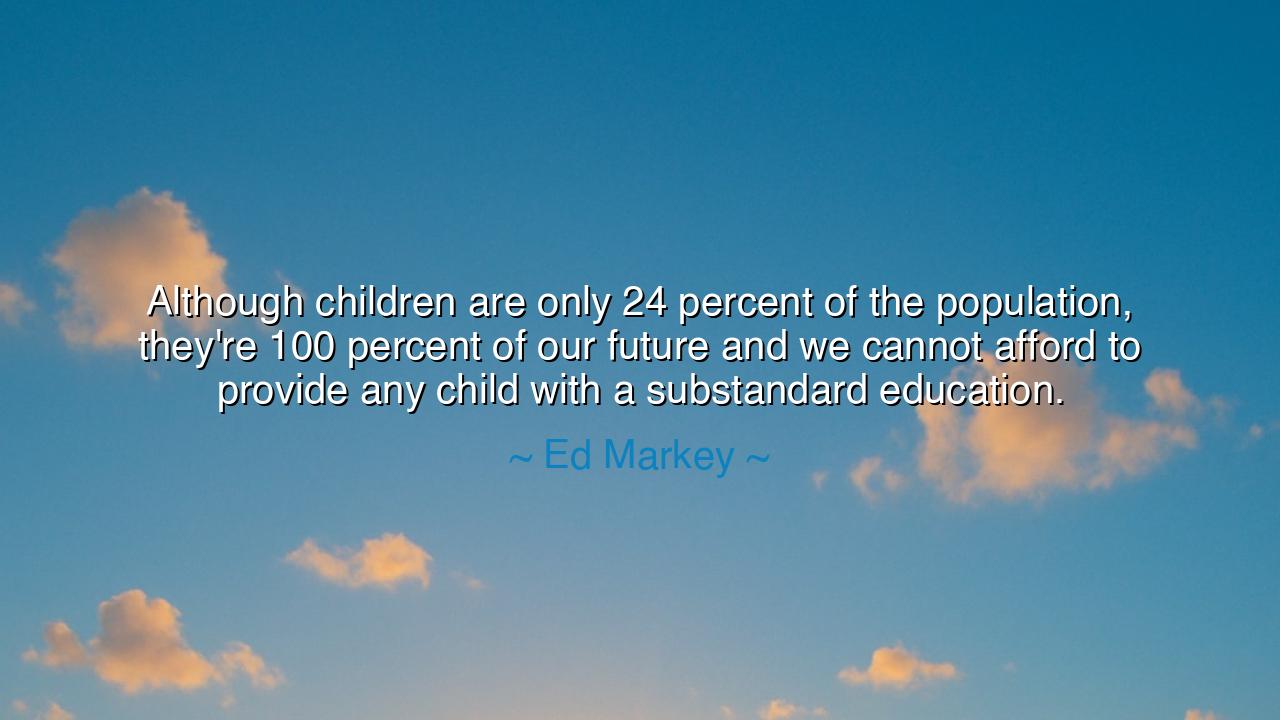
Although children are only 24 percent of the population, they're
Although children are only 24 percent of the population, they're 100 percent of our future and we cannot afford to provide any child with a substandard education.






In the vast circle of life, where every generation rises to take the place of those who came before, the future is always shaped by the children of today. Ed Markey, in his profound statement, "Although children are only 24 percent of the population, they're 100 percent of our future and we cannot afford to provide any child with a substandard education," speaks directly to the heart of society’s responsibility to nurture and guide the next generation. His words are not just a call for education, but a recognition that the destiny of any nation lies in the hands of its youngest members, who must be given the tools to build a better future.
The ancients understood this truth well. In the great city-states of Greece, the philosophers taught that a strong society was one built upon the minds of its youth. Plato, in his work The Republic, emphasized the importance of education in shaping the soul of a person and, by extension, the soul of a nation. He believed that only through proper education could a society ensure its stability, wisdom, and virtue. Just as Plato understood the pivotal role of the young in determining the future of Athens, Markey’s words underscore the vital importance of ensuring that education—the foundation of future success—is not just available, but of the highest standard.
Consider the rise of the Roman Empire, where the education of the young was central to the continuation of the empire's greatness. Romans believed that the next generation carried not only the legacy of their ancestors but also the responsibility to advance the society they inherited. The great leaders of Rome, such as Julius Caesar, were well-educated, not just in matters of war, but in philosophy, literature, and governance. Their education gave them the tools to lead and to transform the world around them. Similarly, Markey reminds us that if we fail to give our children a strong and equitable education, we risk denying them the tools they need to lead and transform the world of tomorrow.
The importance of education is reflected in the lessons of history. When America sought its independence from Britain, it was not just the warriors who fought on the frontlines, but the intellectuals, the thinkers, and the educators who sowed the seeds of revolution through their writings and ideas. Thomas Paine’s Common Sense ignited the spark of independence, while figures like Benjamin Franklin helped establish the institutions that would guide the nation in its early years. These men understood that an educated citizenry is the bedrock of a free and prosperous society. In the same vein, Markey’s words remind us that an investment in the education of our children is an investment in the health and stability of the future.
Yet, in the present day, we find too many children being denied the quality education they deserve. In the face of growing inequality and disparity in access to resources, Markey warns that a substandard education is not just an issue of personal failure, but of societal failure. We cannot afford to ignore the young minds that are being left behind. Just as a farmer must nurture the soil to ensure that the seeds they plant grow strong, so too must we nurture the minds of our children. For if we neglect them, we risk the collapse of the very foundation upon which our future is built.
The lesson, then, is clear: education is the gateway to the future. To deny any child the opportunity to receive a quality education is to deny them the chance to fulfill their potential and, by extension, deny society the possibility of progress. Markey calls upon us to recognize the urgency of this task—to ensure that the systems of education we create are equitable, accessible, and designed to empower the next generation. As leaders, whether in the home, the classroom, or the halls of power, we must recognize that the youth are not just the inheritors of our world, but the builders of the world to come.
In our own lives, we must ask ourselves: what role are we playing in the education of the next generation? Are we ensuring that every child has the opportunity to learn and grow to their fullest potential, regardless of their background or circumstances? Whether we are teachers, parents, or citizens, we must actively engage in the mission of providing the highest quality education for our children. For in their hands lies the future we hope to see—a future of innovation, compassion, and wisdom. Let us take Markey’s call to heart and commit ourselves to building a world where every child, regardless of their circumstances, can have access to the education that will allow them to shape the future with courage and vision.






AAdministratorAdministrator
Welcome, honored guests. Please leave a comment, we will respond soon